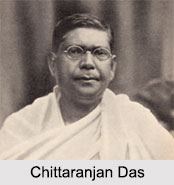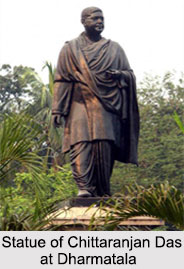 Chittaranjan Das was a leading Indian politician, a famous lawyer, an activist of the Indian National Movement and founder-leader of the Swaraj Party in Bengal during the British rule in India. He was the first mayor after the formation of Calcutta Corporation. He believed in non-violence and constitutional methods in order to achieve national independence. He advocated Hindu-Muslim unity, co-operation and communal harmony. Chittaranjan Das is normally referred to by the title of "Desh Bandhu" meaning “Friend of the Nationâ€. For his strong belief in the concept of self government for India, he was called Desh Bandhu. He was directly associated with a number of literary societies and wrote poems, apart from many articles and essays.
Chittaranjan Das was a leading Indian politician, a famous lawyer, an activist of the Indian National Movement and founder-leader of the Swaraj Party in Bengal during the British rule in India. He was the first mayor after the formation of Calcutta Corporation. He believed in non-violence and constitutional methods in order to achieve national independence. He advocated Hindu-Muslim unity, co-operation and communal harmony. Chittaranjan Das is normally referred to by the title of "Desh Bandhu" meaning “Friend of the Nationâ€. For his strong belief in the concept of self government for India, he was called Desh Bandhu. He was directly associated with a number of literary societies and wrote poems, apart from many articles and essays.
Early Life of Chittaranjan Das
Chittaranjan Das was born on 5th November 1870 at Bikrampur, Dhaka, Bangladesh. He belonged to an extremely educated family with rich cultural surroundings. His family members were a part of Brahmo Samaj. Chittaranjan Das was the son of Bhuban Mohan Das, and nephew of the Brahmo societal reformer Durga Mohan Das. He had completed his education in England and became a Barrister. His career began in 1909 when he defended Aurobindo Ghosh on charges of involvement in the Alipore bomb case. Chittaranjan Das completed his graduation in 1890 from Presidency College, Kolkata. He went abroad to England to sit for the Indian Civil Service examination. He failed to clear the examination. When he returned to India in 1893, he started practicing law in the Calcutta High Court.
 Contribution of Chittaranjan Das in Indian Freedom Struggle
Contribution of Chittaranjan Das in Indian Freedom Struggle
Chittaranjan Das set up a student union and also raised his voice for the use of Bengali language in university examinations. He significantly contributed with Bipin Chandra Pal and Aurobindo Ghosh in writing "Bande Mataram", an English language weekly newspaper. He also tried to encourage the ideas of "Swaraj" among the young Indian freedom fighters. He was involved in active politics from 1917 to 1925. He was associated with the revolutionary organisations like the Anushilan Samiti.
Chittaranjan Das also put the thought of rebuilding villages throughout the incorporation of local self-government and helpful credit society systems. He also wanted to provide a new face to the cottage manufacturing. He became a famous figure in the Indian National Congress, known for his inherent skills in public speaking and political insight.
Chittaranjan Das joined his hands with Mahatma Gandhi in the Non -Cooperation Movement. He was arrested by the British Government in 1921 along with his wife and son. During the Non-Cooperation movement, Das became a symbol of patriotism and courage. He realized that political permanence could only be brought in India by reuniting the Hindus and Muslims. He initiated the ban on British clothes, setting an example by burning his own European clothes and wearing Khadi clothes. Like Gandhiji, he believed in the idea of non-violence. He felt that education was mandatory for India. He laid importance on women freedom and helped Ishwar Chandra Vidyasagar`s movement for widow re-marriage.
Chittaranjan Das in Indian Literature
Chittaranjan Das always had a style for writing and this was apparent in his literary magazines like "Narayan", "Mala", "Sagar Sangit", "Kishore-Kishoree" and "Antaryami". He brought out a newspaper called "Forward" and afterwards changed its name to "Liberty to Fight the British Raj". In 1913 he published a book "Sagar Sangeet".
Personal Life of Chittaranjan Das
Chittaranjan Das got married to Basanti Devi and had three children namely, Aparna Devi, Chiraranjan Das and Kalyani Devi. Basanti Devi also took part into the freedom movement and was the first woman to court arrest. In 1925 Chittaranjan"s health began to fail due to overburden of work. He died on 16th June 1925 at the age of 54 with a severe fever.




















